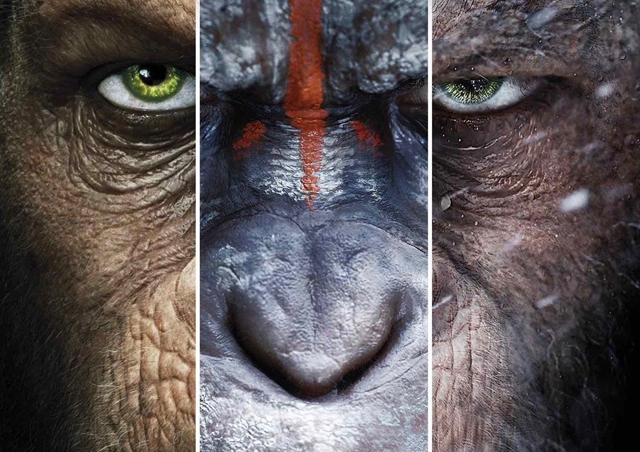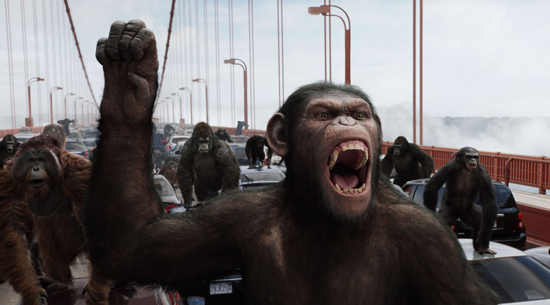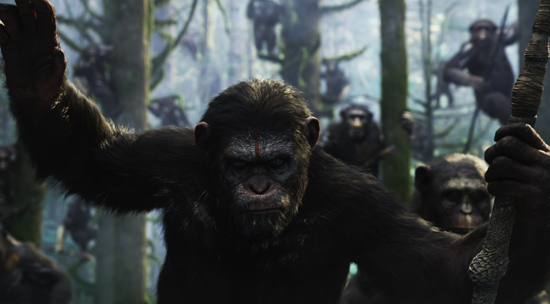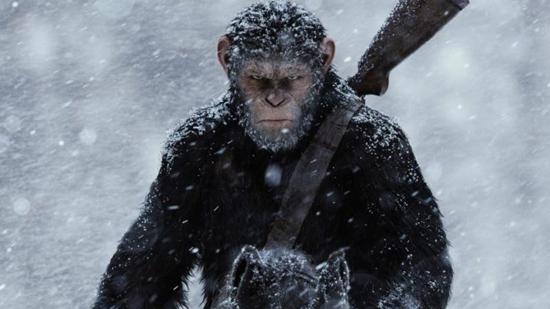
Back in the 1960’s, as the world became embroiled in a number of on-going tragedies, from the ongoing war in Vietnam to numerous assassinations of political and social movement leaders, there was also a major shift going on within Hollywood. The mega-budget, opulent and airy musicals and epics that dominated the early part of the decade were suddenly out of flavor with audiences who now wanted what they saw on the big screen to better reflect the harshness of the world that they were currently living in. One of the places that best represented this shift in a microcosm was 20th Century Fox. In the latter part of the 60’s, Fox began to hit hard times as their expensive old-fashioned musicals like Doctor Doolittle (1967) and Hello, Dolly (1969) ended up flopping at the box office. To better connect with a newer, more cynical audience, they had to adjust quickly and find a new type of movie to help salvage their brand into the future. Strangely enough they found that film in a strange little science-fiction thriller called Planet of the Apes (1968). Directed by Franklin J. Schaffner, written by The Twilight Zone’s Rod Serling, and starring the king of epics himself Charlton Heston, Planet of the Apes was a cultural phenomenon, becoming one of the biggest box office hits of it’s time. The story itself is pretty simple, an astronaut lands on a planet where apes have become the dominant species, but it’s execution on all fronts (writing, direction, performance and especially score) that helped to make it resonate even more. And then of course there is that legendary twist ending which has been parodied relentlessly over the years. The success of the movie led to a series of sequels, though none made the same impact as the original film did. For a while the franchise went dormant, though the first movie remained a mainstay in Science Fiction circuits. Eventually, Fox believed they could do something once again with the property, which led them to greenlight a remake in 2001, under the direction of Tim Burton. Unfortunately, that film turned out to be a colossal mess, neither capturing any of the cinematic wonder of the original, nor showcasing any of Burton’s trademark weirdness. And once again, the Apes franchise was abandoned.
But, in the early 2010’s, a new team at Fox decided it was time to undertake another chance at rebooting the Apes franchise for a new generation. This time around, the filmmakers would be utilizing the latest in motion capture animation to bring their apes to life. Fox approached Weta Digital, the New Zealand based visual effects studio behind the Oscar-winning CGI of The Lord of the Rings trilogy, and sought their expertise to pull off a different way of creating life-like apes that evolve to be more human like. With The Lord of the Rings, the Weta Digital team made ground-breaking use of motion capture to make their digital creations come to life in a way never before imagined. The most astonishing achievement from those films was in the remarkable creation of the creature Gollum; a digital character so lifelike that it proved to Hollywood that yes, even a visual effect could carry a dramatic performance on screen. Seeing how well the Weta team brought Gollum to life, Fox believed that this would be the best way to take their Apes franchise in a whole new direction. In the original films, the way that the filmmakers were able to bring these humanized apes to life was through ground-breaking make-up effects, courtesy of Oscar winner John Chambers. But, as impressive as the make-up was, there was still the tell-tale signs of the actor underneath the make-up that made the illusion work only to a point. Now, with motion-capture, the filmmakers could take the movements of real actors and fix a photo-realistic digital skin of an ape on top of their performance. Thus, Fox could have a Planet of the Apes movie where the apes indeed looked like the real thing. But, as good as the animation would be, it would still be dependent on the actor who was performing the role. Thankfully for Fox and the new Apes franchise filmmakers, they managed to get the actor who had plenty of experience performing within the confines of motion capture technology; the man who brought Gollum himself to life, Andy Serkis. And as we will see, his contribution would launch a whole new era for the Planet of the Apes franchise with a trilogy centered around his character; the Ape known as Caesar.

RISE OF THE PLANET OF THE APES (2011)
Directed by Rupert Wyatt
Instead of following immediately after the last canonical film in the original series, Battle for the Planet of the Apes (1973), or after the terrible Tim Burton version, this new reboot wisely rolls things back to the beginning. And by beginning, I don’t mean back to when the original film started. For Rise of the Planet of the Apes, the story actually brings us to where it all began; before the Apes evolved into their humanized form. We all know from the original movie that the Planet of the Apes itself is our own Earth after a cataclysmic even caused most human life to die off, with Apes rising up to become the dominant species. With that knowledge in hand, we get to see how that apocalyptic future came to happen. At the heart of the story is a chimpanzee named Caesar. Caesar is discovered to have been born with unnaturally high intellect as a result of experimentation from the lab he was born into by doctors seeking a cure for dementia related illnesses. Caesar is capable of communication with his caretakers through sign language and he displays evidence of critical thinking and human like emotion. But, corruption at the lab leads him to be sold to a zoo, where he begins to turn resentful of the mistreatment of his fellow simian-kind there. Eventually, he steals the drug made his brain more human-like and uses it on the other apes, leading them to revolt en masse. Eventually Caesar does lead his band of apes out of the city and into the wild, but his actions also came at a steep cost. The pathogen that increased the apes brain activity also unleashes a deadly virus on the human population, leading to a catastrophic global pandemic that plays out in the end credits.
For a reboot of this longtime franchise, this was a pretty successful end result. The thing that really helps this movie stand out is the stellar performance of Andy Serkis as Caesar. The actor, of course, disappears into the character as it is a digital overlay over his physical pantomime, but even still there is such skill in how he is able to bring so much personality into the role even through that digital skin. It’s the subtleties of his performance that really sells his work here, especially in the facial acting. Andy Serkis, when not performing in motion capture, is a very expressive actor physically, and the command that he has in his facial action is particularly on a different level. Often the Lord of the Rings animators had to exaggerate the Gollum model in order to have it rise to the level of what Serkis gave them in his original on set performance. Naturally, he refined this skill working within the confines to motion capture, and Caesar is a testament all those years of experience. The one downside to his strong performance in this movie is that it outshines everything else. Caesar is almost too strong of a character, as most of the human characters are flat or uninteresting. James Franco is fine as the scientist that helped raise Caesar, but his character is more or less just a function of the story and has little in the way of an arc. The one other downside is that despite the motion capture animation looking quite impressive throughout, the compositing to Caesar and the other apes into the scenes is still not as good as it could have been. You are still very much aware that you are looking at visual effects, as the seam lines between digital characters and the real world environment still don’t quite blur. Even still, for a franchise reboot that had a lot prove to audiences, it’s a commendable starting point. And as we would see later, this franchise would not only survive into the new millennium, but thrive as well.

DAWN OF THE PLANET OF THE APES (2014)
Directed by Matt Reeves
While Rise of the Planet of the Apes was a general, by the numbers action flick that did it’s part fairly well, Dawn would see the franchise not only reach it’s potential, but it would even supplant the original series as the most ideal telling of this story. This was the Planet of the Apes movie that every dreamed about but was only now fully realized. Andy Serkis returned once again to continue Caesar’s story, and this time the rebooted series would have Matt Reeves behind the camera. Reeves made a splash a few years prior with his ground-breaking found footage film Cloverfield (2008), which showed his mastery in making digital effects feel incredibly real and life-like. While the compositing of the apes didn’t quite work as well as intended in Rise, the animators thankfully were able to refine their tools to make the animation of the apes look better this time around. The hard work paid off, because Caesar and the other apes are astonishingly well animated here. The compositing is so good that it indeed looks like they are occupying the same space as the live action actors, with the seams basically gone. Matt Reeves style of filmmaking is particularly well used here. He does a great job of making the world look bleak and wild in this pandemic affected not too distant future. The tone is especially set up perfectly in the opening scene of the movie as we observe the Earth from space, watching the lights go out on the power grid and the chatter on the radio frequencies growing quieter and quieter; a chilling representation of mankind’s downfall. This is not the campy, minimalist version of Planet of the Apes that we’re all familiar with from the 60’s. Reeves take on the franchise treats the premise with absolute sincerity and seriousness, and with the visual effects being as good as they are, that serious side to this story actually works.
Striking that more serious tone in turn elevates the concept of the story even more. Before the franchise thrived off of it’s weirdness and campy elements. Reeves took this franchise in a different direction, treating it more like a war movie, but with intelligent apes. What’s interesting is that the movie manages to find even more character development to give to Caesar as part of his ongoing narrative. In the last movie, we saw him lead a revolt. Here we see him be a pragmatic leader, choosing to avoid conflict with the surviving humans as a means of protecting his community. He’s fully aware of his status as a leader and here we see him use that title responsibly. It’s very much in contrast with another ape named Koda (Toby Kebbel), who is very much out for cold-blooded vengeance, and thus he becomes the antagonist of the film. Kebbel does a fairly good job himself in portraying Koda, especially with the gnarly character model put onto his motion capture performance. It’s interesting that a couple year later, Kebbel would play another motion capture animated ape named King Kong in the film Kong: Skull Island (2017), a role that Andy Serkis also filled in 2005 remake by Lord of the Rings director Peter Jackson. The one downside to the movie is that the live action human characters are nowhere near as compelling as the apes are; a problem that the first film also shared. Even a great actor like Gary Oldman feels wasted in a thankless role that means little to Caesar’s own story. Had the conflict mainly stayed on the rivalry between Caesar and Koda, the movie might have been less uneven. Even still, it’s an incredible tonal reformation of this series, and one that really delivers on what a Planet of the Apes movie should be. Where Matt Reeves really excels the most is in his portrayal of the action scenes, which have the intensity of a fully immersive war movie. As we would see moving ahead, this kind of style would continue to build into an even more compelling portrayal of Caesar’s story.

WAR FOR THE PLANET OF THE APES (2017)
Directed by Matt Reeves
Both Matt Reeves and Andy Serkis return to pick up right where Dawn left off, and not only do they match the high standard left by the previous Apes movie, but they also managed to improve upon it. This concluding chapter in what would be known as the Caesar trilogy brings his story full circle to a satisfying conclusion. What is left of humanity has grown hostile to the Apes who are rising in power, and now Caesar and his community finds themselves being hunted. Leading the blood-thirsty band of mercenaries is a man known simply as the Colonel (Woody Harrelson). In confronting the Colonel, Caesar is tested like never before, seeing so many of kin falling victim to the Colonel’s cruelty while trying to maintain his own restraint in rising above his own animal instincts. What makes War work so much better than the other films in this reboot comes down to one important thing; compelling human characters. Woody Harrelson makes the Colonel a terrifying villain, and one that especially raises the stakes of this series even more. His introduction into the movie, where his troops invade the Apes sanctuary and begins to slaughter them is a particularly harrowing scene, especially with the eerie shadows they cast in the moonlight reflecting off a waterfall. The movie also shows the great advancement that has been made in motion capture animation in the years since the reboot began. The uncanny valley has been fully crossed and there is no visible seams that manifest that makes the apes look anything other than fully physical characters. The subtlety of acting from Andy Serkis is fully on display through the Caesar model, making his performance all the more compelling. The intensity of the performance also comes through, especially in the moment when he’s at gunpoint. You see everything read through Caesar’s face in that moment, which is something that I don’t think would’ve been done without manipulation a decade prior.
The movie also closes the chapter of Caesar’s story in a satisfying way, while also at the same time setting the stage perfectly for what will inevitably be the beginning of the setting for the original movie. Caesar doesn’t know the direction that the planet Earth is going to go with Apes now in charge, but his whole story has been about finding a safe place for his kind to call home, and the story concludes with Caesar in his final action, walking his fellow apes into a safe haven where they can build their future. I think the reason why these movies succeed as well as they do is because of the focus they all have in telling the full story arc of this one central hero. We don’t see much outside of Caesar’s own internal environment. The vision of a decaying world is entirely through his own local community; mainly around the San Francisco Bay area. There’s no intercutting to ape uprisings across the globe; none of that matters at all because it’s Caesar’s control. This is his story, and it’s a credit to the filmmakers that they found such universal themes salvation, humanity and courage in just the story of this one important ape, and that they could maintain that story across a three film arc. Sure, the setting of a decaying world is bleak, but there is hope in that story too as Caesar proves to be an aspirational figure of clear-minded civility in an increasingly uncivil world. It is also interesting that this movie legitimizes the trajectory of the story into what would be the original film, and at the same time ret-cons the sequels it spawned out of canon. Clearly Matt Reeves and company wanted to honor the movie that spawned the series to begin with, but with the skills they have now, they are clearly showing that this is by far the more fully realized version of this concept. Regardless, for an exploration of just one character’s journey through this apocalyptic world, it is a triumph of a complete narrative, with Serkis’ performance being the key ingredient.
The Planet of the Apes franchise has an over 50 year legacy in Hollywood, but I think that it can be argued that the Caesar Trilogy of the 2010’s is the pinnacle of the franchise when it comes to storytelling. With state-of-the-art visual effects making it possible for human actors to fully act within the skin of the apes they are playing, the artificiality that came from the original series goes away and we see the franchise brought to us in the most earnest way possible. The trilogy started off solidly enough, but Rise was just an average action flick compared to the two Reeves film, which really elevated the Apes movies to the compelling epic dramas that they are. They take the basic premise of these movies and strip all cynicism and campiness away, treating the Apes’ stories with the same level of seriousness that you would get from a war flick. It of course is not just the director’s vision that makes that take on the concept work. Andy Serkis, digging into all the acting expertise he has while wearing his motion capture suit, just brings Caesar to devastating life, complete with all the emotion shown across his face rendered in remarkable detail. You really wouldn’t expect any less from the man who made Gollum leap off of the computer screen and into cinemas in a stunningly life-like way. This trilogy is honestly a text book example of doing justice to a backstory in a prequel to the story that spawned it. We know where the Earth is headed, with it being ruled by “damn, dirty apes.” But what the team behind this reboot, and especially director Matt Reeves, showed us is that how the Planet of the Apes came to be is a compelling story in it’s own right, and one that features a surprisingly complex character at it’s center. Is there more to explore with the world of the Planet of the Apes? Time will tell what Fox and their new parent company Disney plan to do with this title in the future, but regardless, the Caesar Trilogy is a full and complete story that on it’s own proved that this was more than just popcorn entertainment; this franchise could indeed be a strongly themed, character driven drama on par with some of the best to ever come out of Science Fiction.